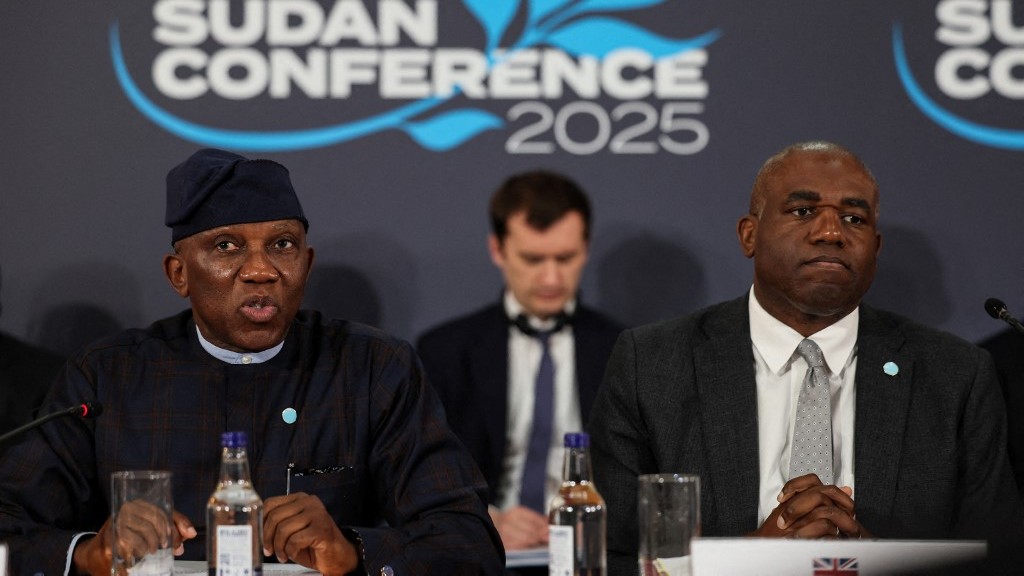London conference on Sudan a diplomatic flop as RSF declares parallel government

A major conference on the conflict in Sudan has ended in chaos after a British-led attempt to set up a contact group for ceasefire talks collapsed on Tuesday amid arguments between Arab states.
Hundreds of civilians have been killed in recent days in two refugee camps in North Darfur, following attacks by the paramilitary Rapid Support Forces (RSF).
The London conference began on Tuesday amid widespread criticism over the UK government's decision not to invite Sudan's government, based in the army stronghold of Port Sudan, or members of Sudanese civil society.
The RSF, which has been sanctioned by the British government, was also not allowed to attend.
However, the British government extended invitations to countries accused of supporting the RSF, including the United Arab Emirates, which has been accused of complicity in genocide at the International Court of Justice.
New MEE newsletter: Jerusalem Dispatch
Sign up to get the latest insights and analysis on Israel-Palestine, alongside Turkey Unpacked and other MEE newsletters
Ali Youssef al-Sharif, Sudan’s foreign minister, warned on Monday that the RSF’s offensive was timed to coincide with the conference and that the paramilitary force would declare the formation of a parallel government.
On Tuesday afternoon, the RSF's leader, Mohamed Hamdan Dagalo, also known as Hemeti, announced the establishment of a rival government as the conference was ongoing.
Laetitia Bader of Human Rights Watch described the conference as a "diplomatic flop" on Wednesday, saying it "seemed more geared towards political grandstanding than seeking solutions that might end the horrendous suffering we are witnessing in Sudan".
The conference ended without a final communique on a way forward, after talks were derailed by lengthy arguments between representatives from Egypt and Saudi Arabia - both understood to be supportive of the Sudanese government - and the UAE.
'Unfathomable and unforgivable'
British Foreign Secretary David Lammy and his counterparts from France, Germany, the European Union and the African Union, co-hosts of the summit, issued a joint co-chairs' statement at the end of the day.
They pledged to support "efforts to find a peaceful solution and reject all activities, including external interference, that heighten tensions or that prolong or enable fighting".
However, human rights group Avaaz pointed out that there was “not a single reference to civilian protection in the official statement”, adding that while “the co-chairs self-congratulate on mobilising aid funding for Sudan, they show no acknowledgment that an immediate mobilisation of aid is required to save the lives of civilians fleeing from the RSF’s bullets and artillery shells which are supplied by the United Arab Emirates”.
“Whilst Lammy has been full-throated in his personal desire to not forget Sudan, the RSF’s genocide continues in Darfur as we speak.”
Kate Ferguson, director at Protection Approaches, said it was "unconscionable" that the statement failed to acknowledge the RSF's assault in North Darfur, which escalated as the conference took place on Tuesday.
Ferguson added that the conference "failed to confront RSF atrocities and its backers, failed to deliver a coalition of conscience to advance civilian protection across Sudan, and failed to secure significant gearshift in international political commitment".
Eva Khair, director of the Sudan Transnational Consortium, said: "The exclusion of Sudanese pro-peace, civilian and civil society actors is unfathomable and unforgivable, but the message from the UK government is clear: Sudanese are expected to cede agency to the interests of meddling states and the security sector.
"A baffling approach from a foreign secretary brought into office on a mandate of decolonisation, partnership and self-determination for Africa and Africans."
War broke out between the Sudanese Armed Forces and the RSF on 15 April 2023 over plans to integrate the paramilitaries into the regular army. The United Nations has described the conflict as the world's worst humanitarian crisis.
Famine has been identified in eight areas of the country, including Zamzam.
The army retains control over large swathes of territory in the east and north, while RSF holds most of Darfur in the western half of the country and parts of the south.
Last year, an independent inquiry carried out by the Raoul Wallenberg Centre found that there is “clear and convincing evidence” that the RSF and its allied militias “have committed and are committing genocide against the Masalit”, a Black African community.
middleeasteye.net